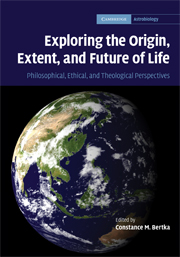 Exploring the Origin, Extent, and Future of Life
Exploring the Origin, Extent, and Future of Life Book contents
- Frontmatter
- Contents
- List of contributors
- Acknowledgements
- 1 Astrobiology in a societal context
- Part I Origin of life
- Part II Extent of life
- Part III Future of life
- 13 Planetary ecosynthesis on Mars: restoration ecology and environmental ethics
- 14 The trouble with intrinsic value: an ethical primer for astrobiology
- 15 God's preferential option for life: a Christian perspective on astrobiology
- 16 Comparing stories about the origin, extent, and future of life: an Asian religious perspective
- Index
- References
16 - Comparing stories about the origin, extent, and future of life: an Asian religious perspective
from Part III - Future of life
Published online by Cambridge University Press: 29 December 2010
- Frontmatter
- Contents
- List of contributors
- Acknowledgements
- 1 Astrobiology in a societal context
- Part I Origin of life
- Part II Extent of life
- Part III Future of life
- 13 Planetary ecosynthesis on Mars: restoration ecology and environmental ethics
- 14 The trouble with intrinsic value: an ethical primer for astrobiology
- 15 God's preferential option for life: a Christian perspective on astrobiology
- 16 Comparing stories about the origin, extent, and future of life: an Asian religious perspective
- Index
- References
Summary
Paradigms of cosmic meaning
The purpose of this chapter is to compare and contrast Western and Asian ways of telling stories about the world rather than the actual stories they tell. The hope of this exercise is that by understanding the logic that drives Asian storytelling, we can see a new way of getting past the inevitable differences between the stories that religion and science tell. This way of approaching conflicting stories, it will be argued, offers significant improvements over two popular strategies for reconciling religion and science: first, the argument that they tell completely different and non-overlapping stories; and second, the attempt to integrate religious and scientific stories into one seamless whole. In contrast to these approaches, the logic of Asian storytelling recognizes the importance of having many different and overlapping stories about the same event without feeling compelled to reconcile them to each other.
The voyages of discovery that spanned the globe and mapped new continents in the early modern era of European history were underwritten by faith in progress and the capacity of human knowledge – which were, in turn, rooted in a Judeo-Christian philosophy of history. In the present age, which has already embarked upon interplanetary exploration, we are situated in a vastly more complex ethical and religious world: the prior age of exploration and intercultural contact has revealed the diversity of religious and philosophical perspectives within Earthbound cultures.
- Type
- Chapter
- Information
- Exploring the Origin, Extent, and Future of LifePhilosophical, Ethical and Theological Perspectives, pp. 303 - 320Publisher: Cambridge University PressPrint publication year: 2009
References
- 1
- Cited by
